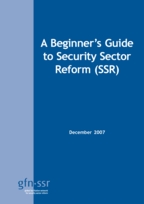General texts on SSR in South-Eastern Europe – The Balkans
- SSR: General
- Defence Reform
- Police Reform
- Justice Reform
- Small Arms and Light Weapons
- Private Security Companies
SSR: General
Ebnöther, A.H., Fluri, P.H. and Jurekovic, P. (eds.), 2007, Security Sector Governance in the Western Balkans: Self-Assessment Studies on Defence, Intelligence, Police and Border Management Reform, National Defence Academy, Bureau for Security Policy at the Austrian Ministry of Defence and DCAF in co-operation with PfP-Consortium of Defence Academies and Security Studies Institutes
In order to institutionalise democratically-based security sectors and achieve Euro-Atlantic integration, Western Balkan countriesneed to change their value systems substantially. This book, published by the Austrian Ministry of Defence and the Geneva Centre for Democratic Control of Armed Forces (DCAF) in cooperation with the Partnership for Peace Consortium, is an assessment of the status of security sector reform (SSR) in the Western Balkans. SSR in Western Balkan countrieshas been heavily influenced by assistance from the European Union (EU) and the North Atlantic Treaty Organization (NATO). Given their desire to join both institutions, Albania, Bosnia-Herzegovina, Croatia, the Former Yugoslav Republic of Macedonia, Serbia and Montenegro have begun to incorporateEuro-Atlantic security norms and standards. All countries have developed SSR legislation, including language calling for security sector transparency and public accountability. Despite SSR legislative progress, Western Balkan security institutions need to establish more transparency and accountability and improve their policy formulation and implementation capacities.
Marenin, O., 2007, Security Sector Reform in the Western Balkans: Assessing Progress, in Security Sector Governance in the Western Balkans: Self-Assessment Studies on Defence, Intelligence, Police and Border Management Reform, eds. A. H. Ebnöther, P.H. Fluri, and P. Jurekovic, National Defence Academy, Bureau for Security Policy at the Austrian Ministry of Defence and DCAF in co-operation with PfP-Consortium of Defence Academies and Security Studies Institutes, pp. 273-288
How has security sector reform (SSR) progressed in the Western Balkans? This Austrian Ministry of Defence paper examines the progress of SSR and Integrated Border Management (IBM) against EU and international criteria in Albania, Macedonia, Serbia, Montenegro, Bosnia-Herzegovina, and Croatia. It finds that the biggest weakness in SSR reform is the lack of implementation capacity and the political realities of reform. International cooperation and assistance for all countries would be useful.
Defence Reform
Jazbec, M., 2005, Defence Reform in the Western Balkans: The Way Ahead, Policy Paper 06, Geneva Centre for the Democratic Control of Armed Forces (DCAF), Geneva
What next for defence reform in the Western Balkans? This paper aims to present and analyse defence reform processes in the European sub-region of the Western Balkans. Defence reforms have already proved themselves as one of the most important and influential parts of the overall reform process. The defence reform process requires clear understanding of the security environment. It must be carefully planned, sensitively shaped in its implementation, and during the course of time constantly adapted, accompanied by strong political support. Reforms so far have been primarily the result of constant pressure from the international community, combined with both the decreasing amount of defence expenditure and changes in the security environment. Positive and continuing progress of defence reform (and security sector reform) in the sub-region, regulated through democratic political means, will have a positive effect for the wider region.
Pietz, T., 2006, Defense Reform and Conversion in Albania, Macedonia and Croatia, Brief no. 34, Bonn International Centre for Conversion, Bonn
How realistic is the process of defence reform and conversion planning, and how efficient are the institutional frameworks for reform in Albania, Macedonia and Croatia? What is the role of external support and are sufficient resources available for defence reform in these countries? This briefing from the Bonn International Center for Conversion analyses the development, achievements and shortcomings of defence reform and conversion in Albania, Macedonia and Croatia. Defence reforms in the three countries have resulted in a significant downsizing of military structures in the Western Balkans, guaranteeing regional stabilisation. They have also brought an absence of major unrest from discharged military personnel and the denationalisation and internationalisation of all three countries’ armed forces. All three countries’ security sectors, however, still contain structural deficiencies, including lack of civilian control over the armed forces, conflicting competencies and lack of independent input. Lack of planning and structural problems have also had a negative impact on how all three countries have dealt with resettlement and reintegration.
Simonsen,SG., 2007, Building “National” Armies – Building Nations? Determinants of Success for Post-intervention Integration Efforts, International Peace Research Institute, Oslo (PRIO), Norway
Ethnically representative armed forces in post-conflict countries can encourage a sense of commonality across ethnic boundaries and help secure a fragile peace. This paper, authored by Sven Gunnar Simonsen, cites recent efforts to establish ethnically representative armies and security forces in Afghanistan, Kosovo, Iraq, Bosnia and East Timor. While expectations of what an integrated national army can achieve should be realistic, ethnically integrated national armies can help increase the sense of security among different groups in the population. The military may not be the integrative institution par excellence, but institutions that soften ethnic divisions contribute to peacebuilding.
Police Reform
Harris, F., 2005, The Role of Capacity-Building in Police Reform, OSCE Mission in Kosovo, Department of Police Education and Development, Pristina
What is the role of capacity-building in police reform? This Organization for Security and Co-operation in Europe (OSCE) report argues that police reform programmes require a thoroughly systematic approach to capacity-building as a means to desirable organisational change. A systematic capacity-building programme must be firmly connected to the general framework of a reform process. The report offers a reform strategy based on the experience of police organisations in the former Yugoslavia and other European states.
SEESAC, 2007, Philosophy and Principles of Community Based Policing, 3rd edition, South Eastern and Eastern Europe Clearinghouse for the Control of Small Arms and Light Weapons, Belgrade
Before the political upheaval of the 1990s, police forces in the former Yugoslavia and Albania were centralised and repressive components of the state apparatus. Since then, various initiatives have been undertaken to address the numerous problems of police forces in the region. This has provided an opportunity to introduce community based policing (CBP). This policy document aims to set out the principles and key issues of undertaking successful CBP. It emphasises the importance of a strategic management process in undertaking CBP and, based on this, outlines a ‘model’ for CBP.
Saferworld et al., 2006, Creating safer communities: Lessons from South Eastern Europe, Balkan Youth Union, Centre for Security Studies, CIVIL, Forum for Civic Initiatives, Saferworld
Effectively addressing security issues requires partnership between those affected by insecurity and those responsible for maintaining the welfare and safety of the public. This publication outlines the approach to community safety developed in Southeastern Europe by Saferworld, the Balkan Youth Union (BYU), the Centre for Security Studies – Bosnia-Herzegovina (CSS), CIVIL and the Forum for Civic Initiatives (FIQ). The approach is guided by a number of principles, including community participation, empowerment and inclusivity, conflict-sensitivity and sustainability. It involves accompanying communities through an action-planning process which enables them to identify and address their own safety concerns in collaboration with others. This approach encourages community action to address security concerns, creates links between communities and official structures, strengthens accountability and improves security situations on the ground.
DeBlieck,S., 2007, The Critical Link: Community Policing Practices in South-Eastern Europe, UNDP Albania/SSSR Programme, Albania
Experts agree that police reform involving the community is critical for peace and development. This document, by the United Nations Development Programme’s (UNDP) Support to Security Sector Reform (SSSR) Programme, looks at project activities that address the issue of community involvement in police reform in Albania, Bosnia-Herzegovina, Croatia, Kosovo, Montenegro, Romania, and Serbia. The research found that all the cases involved the support of a forum allowing the community and police to work together. These forums identify and solve local issues of crime, security and development. In four cases, community-based policy (CBP) has been brought into the classroom. Activities such as awareness education and sports activities involving students and officers create greater trust in the police and may reduce juvenile crime. The report recommends that CBP training should involve all officers and staff and should emphasise the need for community partnerships and problem solving. Yet concrete practices must not only be taught, but also be put into practice in the field.
Justice Reform
UNODC, 2008, Crime and its Impact on the Balkans and Affected Countries, United Nations Office on Drugs and Crime, Vienna
South-East Europe is a region stigmatised for its role in heroin trafficking, human trafficking, and other forms of organised crime. This report, by the United Nations Office on Drugs and Crime (UNODC), argues that the crime situation in the area is improving. Specifically, it suggests that the rise of organised crime in the Balkans was a direct result of past instability, but that the situation seems to be changing for the better. As the region stabilises and the rule of law is secured, the incentives and opportunities for criminality should further fade.
Small Arms and Light Weapons
Saferworld and SEESAC, 2006, South Eastern Europe Small Arms and Light Weapons Monitor 2006, Saferworld and South Eastern and Eastern Europe Clearinghouse for the Control of Small Arms and Light Weapons (SEESAC)
What progress have the countries of South-Eastern Europe made towards controlling small arms and light weapons (SALW) proliferation? This report from Saferworld and the South Eastern and Eastern Europe Clearinghouse for the Control of Small Arms and Light Weapons (SEESAC) outlines progress made on SALW control during 2005-6. States in Southeastern Europe have done far too little during this period to meet international commitments they have made in regard to SALW control. While there is always a need for greater resources, failure of political will is the most obvious explanation for this inertia. Considerable support from civil society and international actors will be required to make progress on SALW control.
Private Security Companies
Page, M., Rynn, S., Taylor, Z. and Wood, D., 2005, SALW and Private Security Companies in South Eastern Europe: A Cause or Effect of Security, South Eastern and Eastern Europe Clearinghouse for the Control of Small Arms and Light Weapons (SEESAC)
The rapid privatisation of security in Southeastern Europe following the rejection of communism in the 1990s mirrors the global trend in which security roles that have traditionally been conducted by the state have been gradually outsourced to private actors. While private security companies (PSCs) in the countries of south-Eastern Europe have recently improved the professionalism of the sector, there is a need for more state intervention to increase the regulation, oversight and professionalism of the industry. This SSESAC survey examines the PSC industry’s key trends and regulatory issues and recommends country-specific reforms. While national regulatory legislation is critical, mutually reinforcing national, regional and international regulatory frameworks are also needed.
SEESAC, 2006, The Sarajevo Code of Conduct for Private Security Companies, South Eastern and Eastern Europe Clearinghouse for the Control of Small Arms and Light Weapons (SEESAC)
Private security provision has increased across the world during the last decade. However, national regulation of private security companies (PSCs) and their activities is often weak or entirely absent. This can result in low standards of professional behaviour and service delivery, and can ultimately have a negative impact on access to justice and security. The Sarajevo Code of Conduct for Private Security Companies, developed by the non-governmental organisations Saferworld (UK) and the Center for Security Studies (BiH), provides basic principles for voluntary adoption by PSCs when national regulation is either weak or entirely absent. Based on European and international best practice, it covers a wide range of areas, including recruitment, training, health and safety, non-discrimination and relations with clients the police and other security companies.









